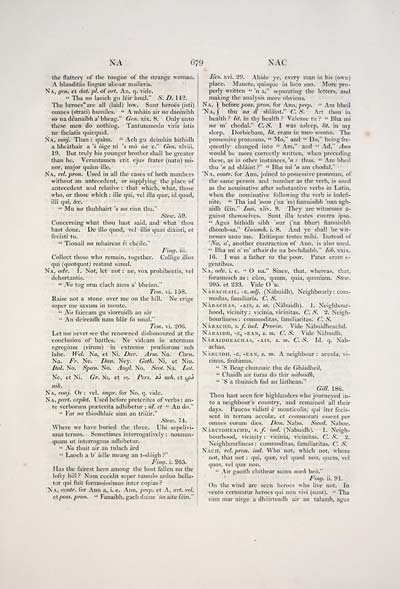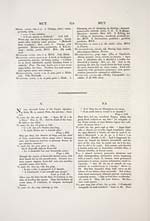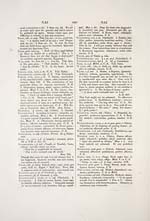Download files
Complete book:
Individual page:
Thumbnail gallery: Grid view | List view

NA
079
NAC
the flattery of the tongue of the strange woman.
A blanditiis linguae alienae niulieris.
Na, gen. et dat. pt. of art. An, q. vide.
" Tha im laoich gu leir iosal." -S'. D. 142.
The heroes' are all (laid) low. Sunt heroes (isti)
omnes (strati) humiles. " A mhàin air na daoinibh
so na dèanaibh a' bheag." Gen. xix. 8. Only unto
these men do nothing. Tantummodo viris istis
ne facialis quicquid.
Na, coty. Than : quam. " Ach gu deimhin bitliidh
a bhràthair a 's òige ni 's mo ?ia e." Geii. xlviii.
19. But truly his younger brother shall be greater
than he. Veruntamen erit ejus frater (natu) mi-
nor, major quam ille.
Na, rel. jyron. Used in all the cases of both numbers
without an antecedent, or supplying the place of
antecedent and relative : that which, what, those
who, or those which : ille qui, vel ilia quae, id quod,
illi qui, &c.
" Mu na thubhairt 's na rinn thu."
Stew. 59.
Concerning what thou hast said, and what thou
hast done. De illo quod, vel iliis quas dixisti, et
" Tionail na mhaireas ri cheile."
Collect those who
qui (quotquot) restant simul.
toge
ler. Collige illos
X prohibentis, vel
iv. 1. Not, let not
dehortantis.
" Na tog orm clach anns a' bheinn."
Tem.vi. 158.
Raise not a stone over me on the hill. Ne erige
super me saxum in monte.
" Na faiceam gu siorruidh an sàr
" An deireadh nam blàr fo smal."
Tern. vi. 206.
Let me never see the renowned dishonoured at the
conclusion of battles. Ne videam in aeternum
egregiura (virum) in extremo prceliorum sub
labe. Wei. Na, et Ni. Dav. Arm. Na. Com.
Na. Fr. Ne. Dan. Ney. Goth. Ni, et Niu.
/to/. No. Spa7i. No. Ant/l. No. Scot. Na. Lat.
Ne, et Ni. Gr. Ns, et vij. Pers. AJ 7ieh, et csvJ
Na, conj. Or : vel. iynpr. for No, q. vide.
NA,/>art. explet. Used before preterites of verbs: an-
te verborum praeterita adhibetur ; id. et " An do."
" Far }ia thiodhlaic sinn an triùir."
Stezv. 74.
Where we have buried the three. Ubi sepelivi-
mus ternos. Sometimes interrogatively : nonnun-
quam ut interrogans adhibetur.
" Na thuit air an tulach àrd
" Laoch a b' àille measg an t-slòigh ?" i
Fhiff. i. 265. i
Has the fairest hero among the host fallen on the
lofty hill ? Num cecidit super tumulo arduo bella-
tor qui fuit formosissimus inter copias ? j
'Na, contr. for Ann a, i. e. Ann, prep, et A, art. rel. j
etposs.pron. " Fanaibh, gach duine '«a aite fein." \
Ecs. xvi. 29. Abide ye, every man in his (own)
place. Manete, quisque in loco suo. More pro-
perly written " 'n a," separating the letters, and
making the analysis more obvious.
Na, \ before pass. pron. for Ann, prep. " Am bheil
'Na, j thu 'na d' shlàint." C. S. Art thou in
health ? lit. in thy health ? Valesne tu ? " Bha mi
na m' chodal." C. S. I was asleep, lit. in my
sleep. Dorbiebam, lit. eram in meo somno. The
possessive pronouns, " Mo," and " Do," being fre-
(ptently changed into " Am," and " Ad," Ann
would be more correctly wTÌtten, when preceding
these, as in other instances, '« .• thus, " Am bheil
thu 'w ad shlàint ?" " Bha mi 'n am chodal."
'Na, contr. for Ann, joined to possessive pronouns, of
the same person and number as the verb, is used
as the nominative after substantive verbs in Latin,
when the nominative following the verb is indefi-
nite. " Tha iad '7iam ('na 'm) fianuisibh 'nan agh-
aidh fein." Isai. xliv. 9. They are witnesses a-
gainst themselves. Sunt ilia testes contra ipsa.
" Agus bithidh sibh '«ur ('na bhur) fianuisibh
dhomh-sa." Gniomk. i. 8. And ye shall be wit-
nesses unto me. Eritisque testes mihi. Instead of
'Na, a', another contraction of Ann, is also used.
" Bha mi a'm' athairdo na bochdaibh." /06. xxix.
16. I was a father to the poor. Pater eram e-
gentibus.
Na, adv. i. e. " O na." Since, that, whereas, that,
forasmuch as : cum, quura, quia, quoniam. Steiv.
205. et 233. Vide O 'n.
NÀBACHAIL, -E, o!<^'. (Nàbuidh), Neighbourly: com-
modus, familiaris. C. S.
NÀBACHAS, -Ais, s. 7». (Nàbuidh). 1. Neighbour-
hood, vicinity : vicinia, vicinitas. C. S. 2. Neigh-
bourliness : commoditas, familiaritas. C S.
NÀBACHD, s. f. Ì7id. Provin. Vide Nàbuidheachd.
NÀBAIDH, -E, -EAN, s. m. C. S. Vide Nàbuidh.
NÀBAIDHEACHAS, -AIS, s. m. C. S. Id. q. Nab-
NÀBUIDH, -E, -EAN, s. m. A neighbour : accola, vi-
cinus, finitimus.
" 'S Beag chunnaic thu de Ghàidheil,
" Chaidh air turas do thh- 7iàbuidh,
" 'S a thuinich fad an laithean."
Gill. 186.
Thou hast seen few highlanders who journeyed in-
to a neighbour's country, and remained all their
days. Paucos vidisti è monticolis, qui iter fecis-
sent in terrara accolae, et commorati essent per
omnes eorum dies. Dan. Nabo. Swed. Naboe.
NÀBUIDHEACHD, s. f. Ì7ìd. (Nabuidh). 1. Neigh-
bourhood, vicinity : vicinia, vicinitas. C. S. 2.
Neighbourliness : commoditas, familiaritas. C. S.
Nach, rel. pron. ind. Who not, which not, whom
not, that not : qui, quae, vel quod non, quem, vel
quos, vel quae non.
" Air gaoith chithear suinn 7iach beò."
Fi7ig. ii. 91.
On the wind are seen heroes who live not. In
vento cernuntur heroes qui non vivi (sunt). " Tha
sinn mar uisge a dhòirteadh air an talamh, agus
079
NAC
the flattery of the tongue of the strange woman.
A blanditiis linguae alienae niulieris.
Na, gen. et dat. pt. of art. An, q. vide.
" Tha im laoich gu leir iosal." -S'. D. 142.
The heroes' are all (laid) low. Sunt heroes (isti)
omnes (strati) humiles. " A mhàin air na daoinibh
so na dèanaibh a' bheag." Gen. xix. 8. Only unto
these men do nothing. Tantummodo viris istis
ne facialis quicquid.
Na, coty. Than : quam. " Ach gu deimhin bitliidh
a bhràthair a 's òige ni 's mo ?ia e." Geii. xlviii.
19. But truly his younger brother shall be greater
than he. Veruntamen erit ejus frater (natu) mi-
nor, major quam ille.
Na, rel. jyron. Used in all the cases of both numbers
without an antecedent, or supplying the place of
antecedent and relative : that which, what, those
who, or those which : ille qui, vel ilia quae, id quod,
illi qui, &c.
" Mu na thubhairt 's na rinn thu."
Stew. 59.
Concerning what thou hast said, and what thou
hast done. De illo quod, vel iliis quas dixisti, et
" Tionail na mhaireas ri cheile."
Collect those who
qui (quotquot) restant simul.
toge
ler. Collige illos
X prohibentis, vel
iv. 1. Not, let not
dehortantis.
" Na tog orm clach anns a' bheinn."
Tem.vi. 158.
Raise not a stone over me on the hill. Ne erige
super me saxum in monte.
" Na faiceam gu siorruidh an sàr
" An deireadh nam blàr fo smal."
Tern. vi. 206.
Let me never see the renowned dishonoured at the
conclusion of battles. Ne videam in aeternum
egregiura (virum) in extremo prceliorum sub
labe. Wei. Na, et Ni. Dav. Arm. Na. Com.
Na. Fr. Ne. Dan. Ney. Goth. Ni, et Niu.
/to/. No. Spa7i. No. Ant/l. No. Scot. Na. Lat.
Ne, et Ni. Gr. Ns, et vij. Pers. AJ 7ieh, et csvJ
Na, conj. Or : vel. iynpr. for No, q. vide.
NA,/>art. explet. Used before preterites of verbs: an-
te verborum praeterita adhibetur ; id. et " An do."
" Far }ia thiodhlaic sinn an triùir."
Stezv. 74.
Where we have buried the three. Ubi sepelivi-
mus ternos. Sometimes interrogatively : nonnun-
quam ut interrogans adhibetur.
" Na thuit air an tulach àrd
" Laoch a b' àille measg an t-slòigh ?" i
Fhiff. i. 265. i
Has the fairest hero among the host fallen on the
lofty hill ? Num cecidit super tumulo arduo bella-
tor qui fuit formosissimus inter copias ? j
'Na, contr. for Ann a, i. e. Ann, prep, et A, art. rel. j
etposs.pron. " Fanaibh, gach duine '«a aite fein." \
Ecs. xvi. 29. Abide ye, every man in his (own)
place. Manete, quisque in loco suo. More pro-
perly written " 'n a," separating the letters, and
making the analysis more obvious.
Na, \ before pass. pron. for Ann, prep. " Am bheil
'Na, j thu 'na d' shlàint." C. S. Art thou in
health ? lit. in thy health ? Valesne tu ? " Bha mi
na m' chodal." C. S. I was asleep, lit. in my
sleep. Dorbiebam, lit. eram in meo somno. The
possessive pronouns, " Mo," and " Do," being fre-
(ptently changed into " Am," and " Ad," Ann
would be more correctly wTÌtten, when preceding
these, as in other instances, '« .• thus, " Am bheil
thu 'w ad shlàint ?" " Bha mi 'n am chodal."
'Na, contr. for Ann, joined to possessive pronouns, of
the same person and number as the verb, is used
as the nominative after substantive verbs in Latin,
when the nominative following the verb is indefi-
nite. " Tha iad '7iam ('na 'm) fianuisibh 'nan agh-
aidh fein." Isai. xliv. 9. They are witnesses a-
gainst themselves. Sunt ilia testes contra ipsa.
" Agus bithidh sibh '«ur ('na bhur) fianuisibh
dhomh-sa." Gniomk. i. 8. And ye shall be wit-
nesses unto me. Eritisque testes mihi. Instead of
'Na, a', another contraction of Ann, is also used.
" Bha mi a'm' athairdo na bochdaibh." /06. xxix.
16. I was a father to the poor. Pater eram e-
gentibus.
Na, adv. i. e. " O na." Since, that, whereas, that,
forasmuch as : cum, quura, quia, quoniam. Steiv.
205. et 233. Vide O 'n.
NÀBACHAIL, -E, o!<^'. (Nàbuidh), Neighbourly: com-
modus, familiaris. C. S.
NÀBACHAS, -Ais, s. 7». (Nàbuidh). 1. Neighbour-
hood, vicinity : vicinia, vicinitas. C. S. 2. Neigh-
bourliness : commoditas, familiaritas. C S.
NÀBACHD, s. f. Ì7id. Provin. Vide Nàbuidheachd.
NÀBAIDH, -E, -EAN, s. m. C. S. Vide Nàbuidh.
NÀBAIDHEACHAS, -AIS, s. m. C. S. Id. q. Nab-
NÀBUIDH, -E, -EAN, s. m. A neighbour : accola, vi-
cinus, finitimus.
" 'S Beag chunnaic thu de Ghàidheil,
" Chaidh air turas do thh- 7iàbuidh,
" 'S a thuinich fad an laithean."
Gill. 186.
Thou hast seen few highlanders who journeyed in-
to a neighbour's country, and remained all their
days. Paucos vidisti è monticolis, qui iter fecis-
sent in terrara accolae, et commorati essent per
omnes eorum dies. Dan. Nabo. Swed. Naboe.
NÀBUIDHEACHD, s. f. Ì7ìd. (Nabuidh). 1. Neigh-
bourhood, vicinity : vicinia, vicinitas. C. S. 2.
Neighbourliness : commoditas, familiaritas. C. S.
Nach, rel. pron. ind. Who not, which not, whom
not, that not : qui, quae, vel quod non, quem, vel
quos, vel quae non.
" Air gaoith chithear suinn 7iach beò."
Fi7ig. ii. 91.
On the wind are seen heroes who live not. In
vento cernuntur heroes qui non vivi (sunt). " Tha
sinn mar uisge a dhòirteadh air an talamh, agus
Set display mode to: Large image | Transcription
Images and transcriptions on this page, including medium image downloads, may be used under the Creative Commons Attribution 4.0 International Licence unless otherwise stated. ![]()
| Early Gaelic Book Collections > Blair Collection > Dictionarium scoto-celticum > Volume I > (749) |
|---|
| Permanent URL | https://digital.nls.uk/76583816 |
|---|
| Description | Lacks half title page in Volume 1. |
|---|---|
| Attribution and copyright: |
|
| Description | A selection of books from a collection of more than 500 titles, mostly on religious and literary topics. Also includes some material dealing with other Celtic languages and societies. Collection created towards the end of the 19th century by Lady Evelyn Stewart Murray. |
|---|
| Description | Selected items from five 'Special and Named Printed Collections'. Includes books in Gaelic and other Celtic languages, works about the Gaels, their languages, literature, culture and history. |
|---|

